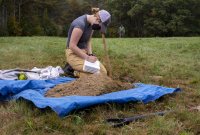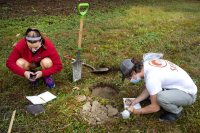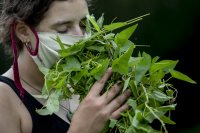
Video: Maine river restoration documentary features environmental economist Lynne Lewis
Professor of Economics Lynne Lewis’ collaborative work on Maine river rehabilitation is featured in the Maine Public Broadcasting Network documentary series Sustainable Maine.
In the series episode “Desperate Alewives,” Lewis joins the discussion of how restoring just one species of river fish, the alewife, can play a huge role in rejuvenating a river’s food web. In the process, Lewis and her interdisciplinary team of researchers and fisheries experts answer the always-important question: Why does river rehabilitation matter?
Lewis and her team’s project is called “Maine Rivers, Estuaries and Coastal Fisheries.” Also including Bates geology professor Beverly Johnson and researchers from Bowdoin College and the University of Southern Maine, the interdisciplinary effort is part of the Sustainability Solutions Initiative at the University of Maine.
Funded by the National Science Foundation, the collaboration will weigh the costs and benefits of river rehabilitation in Maine and the effects of rehabilitation efforts on fisheries and economies.
An environmental economist who chairs the Bates economics department, Lewis’ own research explores the potential benefits and costs of river rehabilitation and, specifically, dam removal.
Johnson’s research seeks to reconstruct the Gulf of Maine’s ancient nearshore ecosystem in order to help scientists predict current responses to natural and human influences. Funded by a $393,000 NSF grant, the interdiscplinary project also includes Will Ambrose (biology) and Bruce Bourque (archeology) of Bates and Robert Steneck of UMaine’s School of Marine Sciences.




